Cork vegetable farmer: There is a legacy here we want to protect
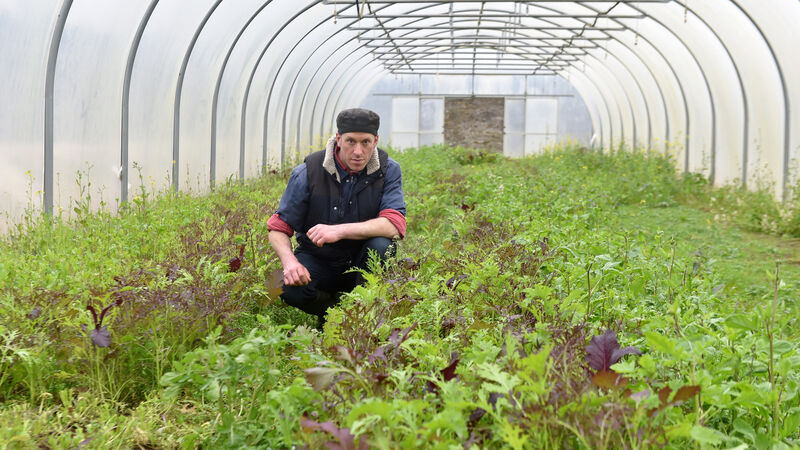
Nigel Martin at Waterfall Farm. Picture; Eddie O'Hare
IN the courtyard behind the family farmhouse is an old stone coach house; a keystone is dated 1827, the patina on the stones match those that once enclosed an orchard, which now is a protected enclosure for an acre of thoroughly modern polytunnels.
Above the entrance way into the old orchard, an old bell hangs, silent now, but once thought to have called the workers in from the field for their lunch, or to announce another end of another working day.
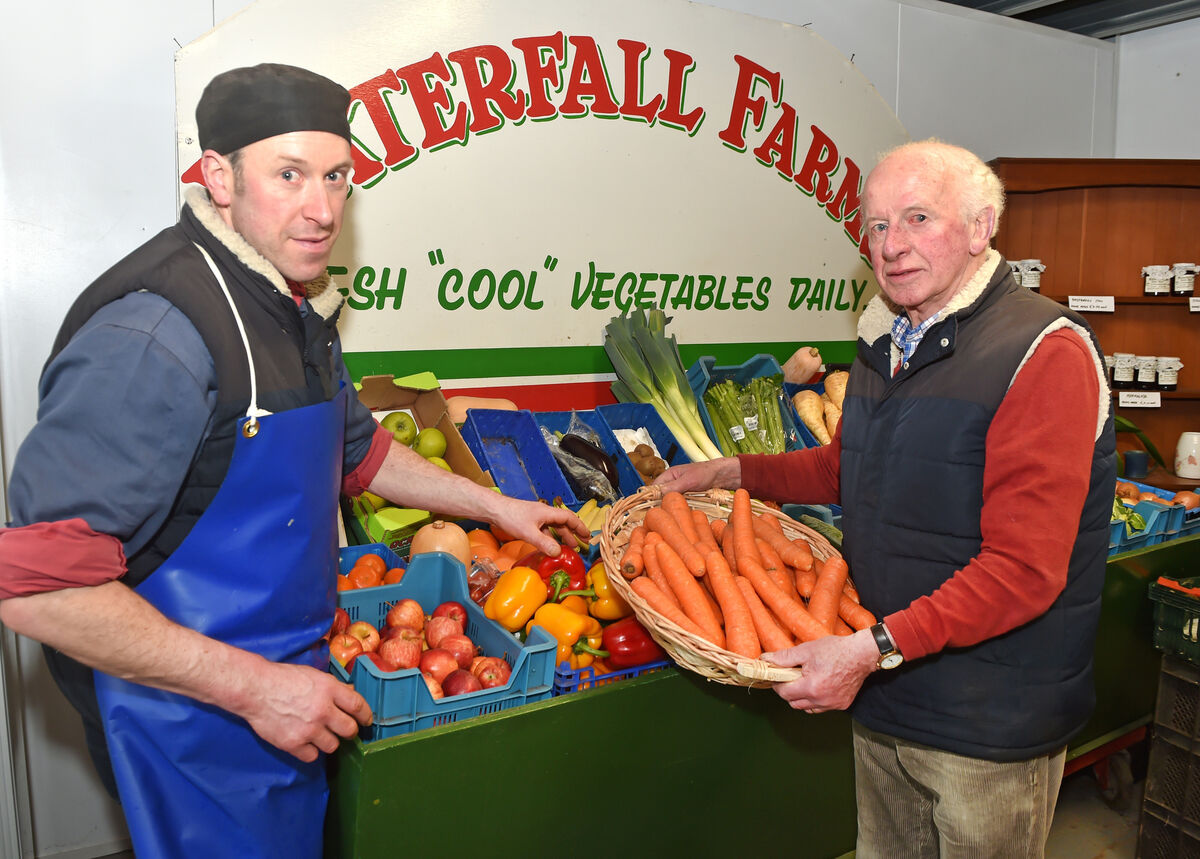
This is Waterfall Farms, a second-generation family horticulture business; and although there are signs the land here has been farmed longer than the Martins have been here, Declan and Rosemary Martin started their farm enterprise in 1967, growing a small selection of vegetables, butterhead lettuce and the like.
In the 1990s, Waterfall Farms began supplying Dunnes but when the contract ended, the farm diversified from just crop growing for the retail trade to also providing a facility offering ready-prepared vegetables to the hospitality and catering trade.
There is also a small farm shop on site serving the local community with field fresh produce.
Rainbow carrots, beetroot, turnips, parsnips, a wide range of herbs, baby leaves and lettuces are all grown here now.
Declan and Rosemary are 84 and 74 respectively, and although still active on the farm, the day to day running of the business is in the hands of their sons, Trevor and Nigel Martin.
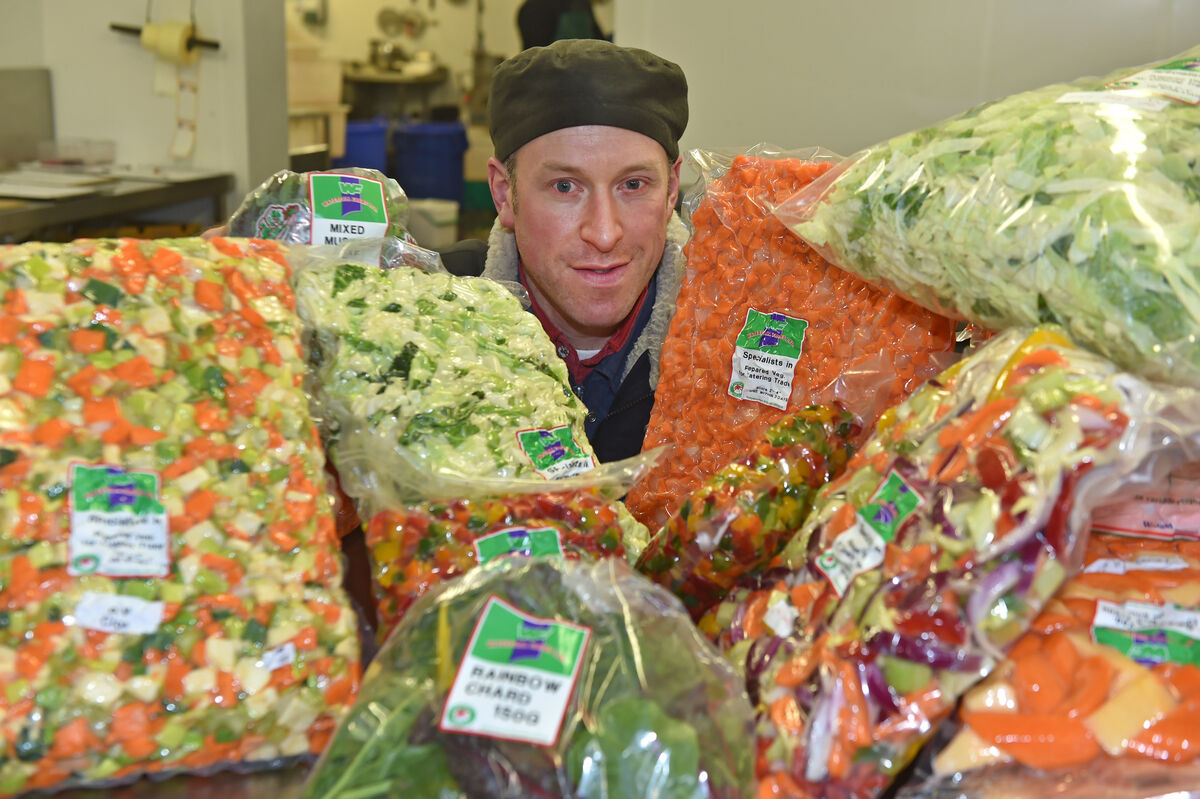
This time of year, the tunnels are busy producing a variety of salad leaves. Seeds are sewn successionally to ensure a continual supply of ready-to-harvest produce.
“Thanks to the tunnels, we can grow virtually all year round,” says Trevor.
A signed-up member with Bord Bia, the farm aims to use as few chemical inputs as possible, preferring to use fleece and netting to protect against pests, and working with local cattle farmers to provide manure and silage that can be ploughed into the crop fields reducing the need for artificial fertilisers.
The netting and fleece can last for up to 15 years and offers a significant saving on artificial farm inputs as well as managing the soil using low intensive methods.
There are two farms, a combined area of 100 acres, with 30 acres under cultivation at any one time.
“It’s important to look after the soil, to rest it and feed it well,” says Nigel.
“In fields that are rested, we grow a high clover mix for five years which we then plough in.”
Clover is a plant that naturally captures carbon from the atmosphere and fixes it as nitrogen in the soil, reducing the need for fertilisers.
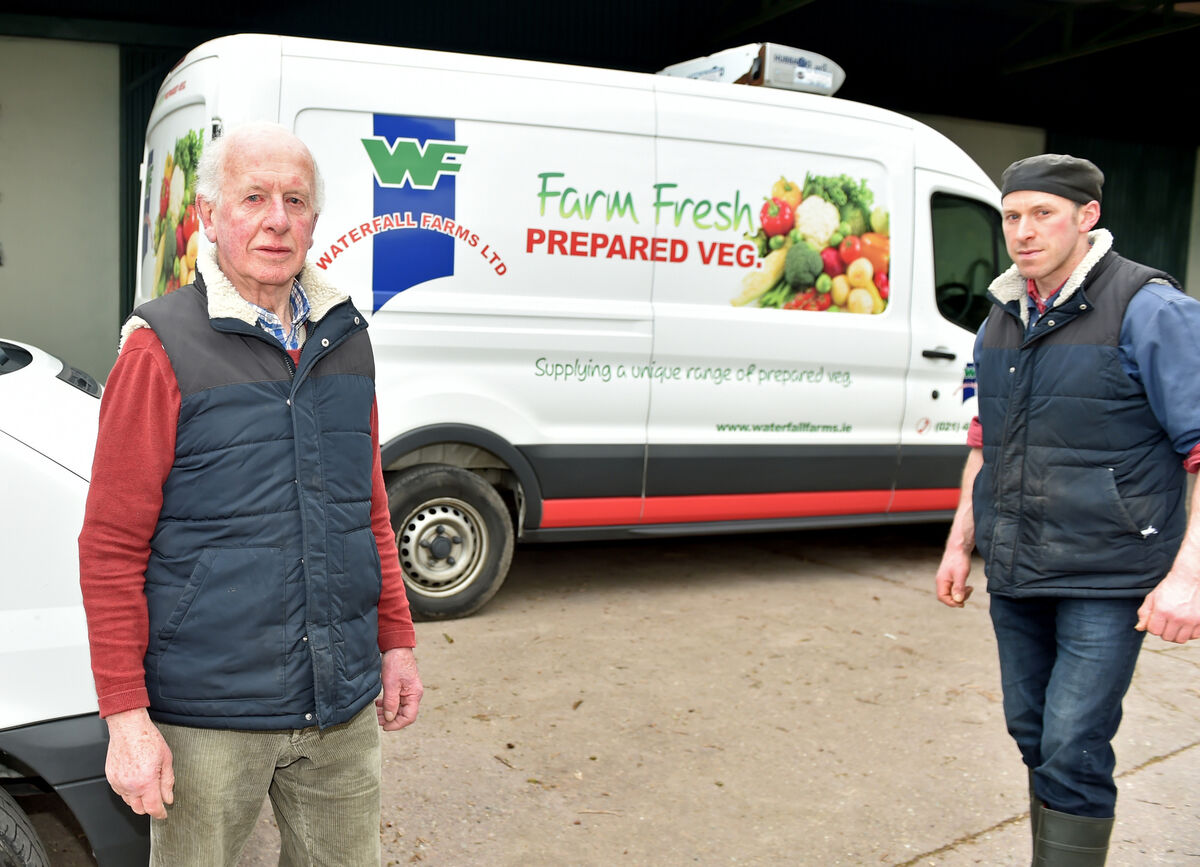
Root vegetable crops - turnip, parsnips, carrots - are harvested and brought to a belt washer. As they move along, they are washed with high power jets. A trap allows for soil on the crops to be collected; “We use that soil to propagate our seeds with; we mix it with our own homemade compost,” explains Trevor.
Soil erosion is a huge problem in agriculture, capturing it for reuse is essential – a simple act of recapture and repurpose with multi-faceted environmental benefits.
The farm is large in contrast to some horticulturalists, but small compared to others who highly specialise in one or two crops supplying supermarket retailers.
“We’re trying new things all the time to adapt. Recently, we cut back our acreage under plastic and by doing that were able to increase the variety of crops we grew and lengthen the growing season too,” explains Trevor.
“We can do spot-cropping for customers looking for something specific, and we can do that because we’re still small enough to offer a bespoke service which allows us to be niche.”
This ability to be bespoke and niche shows up more when we come to the preparation facility.
“Customers can phone in their order and say they want a specific mix of vegetables for a soup, to a specific weight; or they want a stir fry mix but without mushrooms, and swap out sugar snaps for mange tout. Or a ratatouille mix where they want the onion to be cut slightly bigger than the other veg.”
There are 17 staff working the farm and the processing facility. I’m surprised just how much of the cleaning and prep work is done by hand.
“It has to be,” explains Trevor. “Take this packet of sliced mixed peppers; if you did this work with a machine, a quarter of the bag would be water and no good to anyone. You have to treat vegetables gently; slicing by hand, moisture stays in the vegetable and the customer gets a more premium product as a result.”
When it comes to farming, everything has a value; the imperative to not waste anything or find a secondary use for something has been considered at every stage. Any vegetables that don’t meet strict supermarket requirements on sizing or appearance are set aside and used instead for the prepared veg side of the business.
“Once they’re peeled and cut, it doesn’t matter what shape or size they were before,” says Trevor.
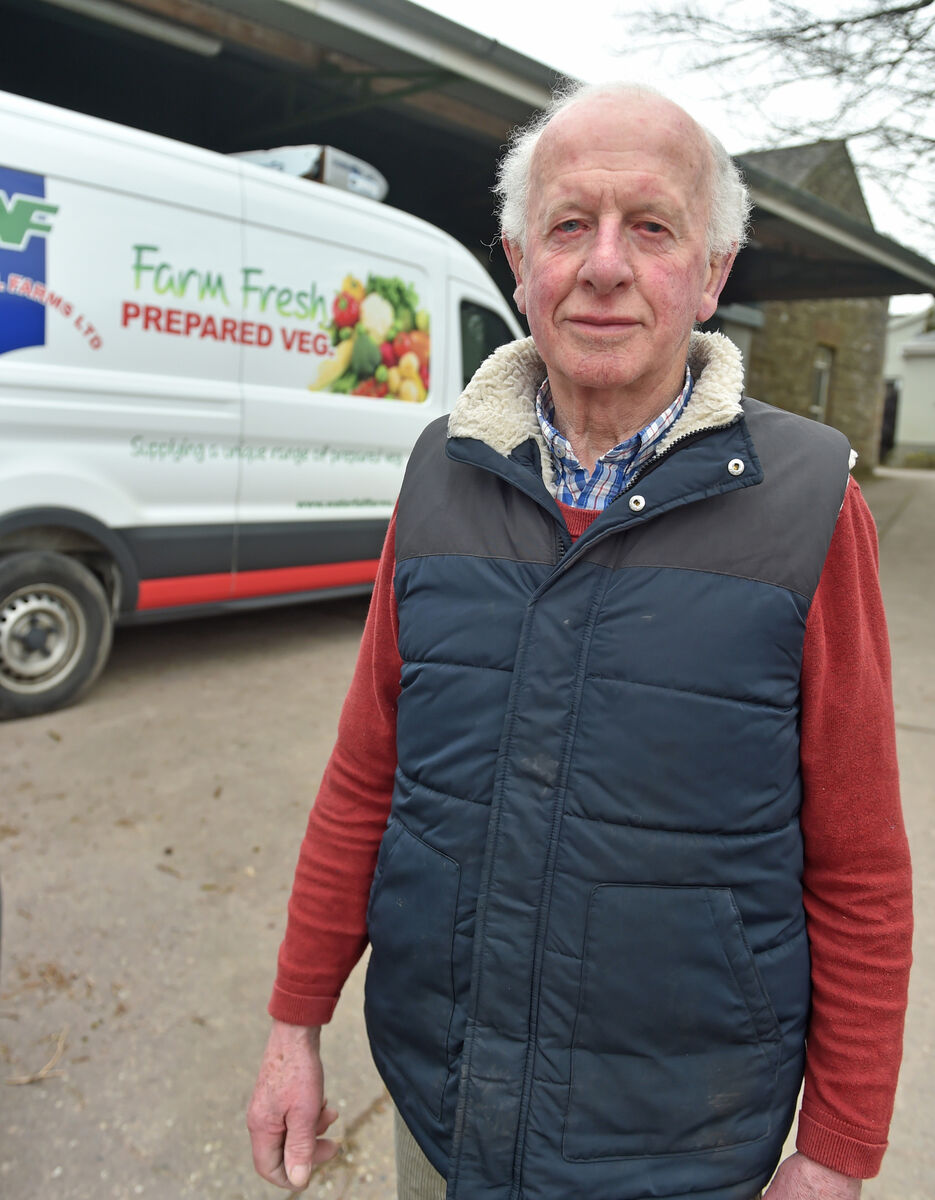
“Any offcuts, peelings, and so on, well that all goes to our farmer neighbours who feed it to their cattle. They gobble it up – they love it, and then we get back the excess manure which we use to fertilise the fields.”
Between all of this, there is no waste, and whatever there is gets recycled into the farm anyway. It’s as close as you’ll get to a closed loop system on a commercial farm, largely because waste is money and money is in short supply when it comes to horticulture.
The prepared veg facility was a necessary diversification in the face of cost pressures.
“We used to supply Dunnes in the ’90s; growing and packing and even buying from other producers to meet the demand.”
It all got too much in the end, and Trevor ended the contract.
“Most of the growers that were around at that time, big and small, are gone now,” he says.
Even with diversification and their flexible approach to growing crops, things are still less than straightforward.
“We’re very much a square peg in a round hole. We grow a variety of crops in large and small amounts.
"How are the likes of Bord Bia supposed to be able to do a bespoke audit for us when the systems are set up for larger, more streamlined, operators? It can’t be done,” says Trevor.
It’s a hard life. Trevor’s day starts when his alarm goes off at 3am and maybe finishes around 6 or 7pm – six days a week.
“I’ve a wife and three kids. I love what I do, but what happens when what you do is taking over your life just to survive? That’s the reality.”
It’s hardly poster-boy stuff for encouraging new horticulturalists to start up.
“The system’s broken, and it’ll only change when there is an awareness and an acceptance by people that prices must increase.
"But it’s not up to a group of growers coming together to make a difference, it must be an initiative at a government level.
“The IFA aren’t interested in veg growers, and Bord Bia are only interested in what can be exported – who’s looking out for us?”
There is government funding available for the horticulture sector but not, says Trevor, for any farming enterprise that is set up as a business – as a limited company, like Waterfall is.
Department of Agriculture figures show the horticulture sector generated an output of €469 million in 2020 with 6,600 people employed in primary production and a further 11,000 in value-added businesses in the sector.
On paper, horticulture has good economic value, but placed alongside the commercial value of Ireland’s export dairy industry alone, which stood at €4.4 bn in 2019, Ireland’s horticulture sector struggles to get its voice heard.
If the attitude towards Irish horticulture sector doesn’t change in the next ten years, maybe less, the prospect of commercially available Irish-grown vegetables looks bleak indeed.
“I’m 42; my brother, Nigel, is 44, and our Teagasc rep tells us we are the youngest growers he has on his books,” says Trevor.
“The horticulture sector is facing a huge decline in growers in the next five to ten years, and we have no financial supports to help us create a level playing field.”
Soon, he says, buying local will become very difficult; supermarkets will no longer be able to say they have Irish-grown vegetables, and only then will customers start to question why that is.
“But by then, it’s too late,” says Trevor.
The on-site farm shop seems an unnecessary burden for the ever-so-busy brothers, but it is very much there to stay.
“We love meeting people and the interaction with everyone. We have a loyalty to our customers and keeping the shop open is the right thing to do,” says Trevor.
It also serves a showpiece for visiting chefs, and culinary students from MTU.
For all the challenges of the sector, Trevor and Nigel still love what they do.
“The business grew from nothing with just a few heads of lettuce grown by our parents.
"There is a legacy here that we want to protect; and, it might sound corny, but there’s still something magical about a freshly ploughed field and seeing seed you’ve sewn grow into something that be harvested, and then to see your name on a restaurant menu – that’s continuity.
“There’s also satisfaction in seeing a sunrise in the morning and going to bed at night, tired, knowing you’ve done a good day’s work,” says Trevor.
There are hard-working people and families behind the food we eat. We seem to see that less when it comes to our vegetables. But it has arguably never been more important for us to value better, protect and support more our vegetable growers than it is today.
For more see www.waterfallfarms.ie







 App?
App?


